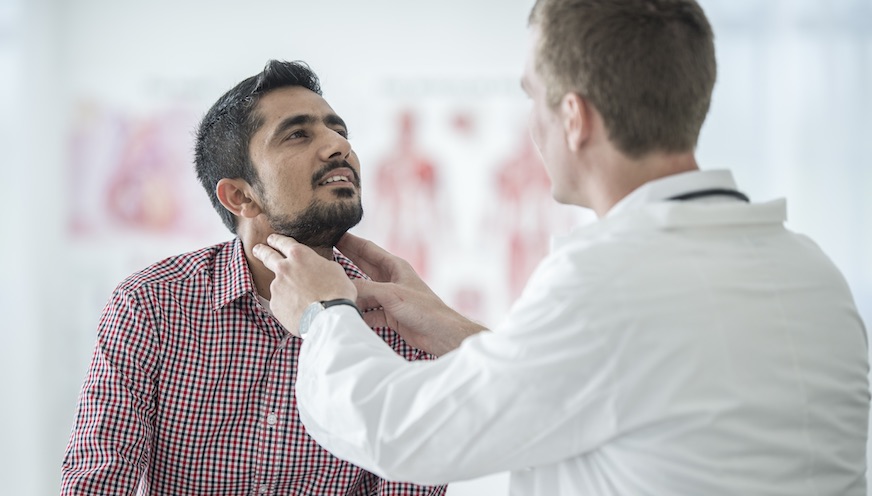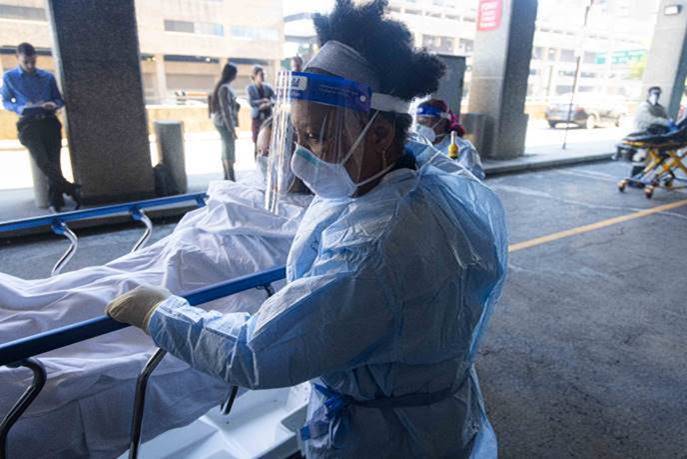The thyroid gland, which sits at the center of our lower necks, is a small organ. But it has a big job — it’s part of the endocrine system, which affects many other systems in our bodies. According to the American Thyroid Association, an estimated 20 million Americans are living with some sort of thyroid disorder, and of that number, 60% are unaware of it. We spoke with Dr. Ilya Likhterov, assistant professor of otolaryngology (ears, nose and throat specialist) to find out more about thyroid health.
Can you explain what the thyroid does briefly?
A thyroid is a gland. It sits in the center of the neck and it produces thyroid hormone, which then affects multiple other organ systems. You can think of it as a gas pedal for the body. When the thyroid hormone goes up, the energy consumption of the body increases; when the thyroid hormone is down, the energy consumption slows down. So, examples would be it promotes the heart to be faster, faster metabolism, weight loss, anxiety, all things that you can think of as an up are associated with an increased level of thyroid hormone. And, weight gain, sleepiness, fatigue, hair loss, those are symptoms of a low thyroid hormone.
Are thyroid disorders something you’re born with, or you develop it, or both?
It can certainly be both. [Common disorder Hashimoto’s disease] and another common example, Graves’ disease, are thyroid dysfunctions where the body’s immune system recognizes the thyroid cells as foreign and starts to attack them. So, that’s something that develops later on. But there are certainly people who are predisposed genetically to thyroid dysfunction.
How are thyroid disorders diagnosed?
Usually patients with thyroid dysfunction come in with one of those symptoms I talked about: hyperthyroidism [overactive thyroid], hypothyroidism [underactive thyroid] and then a lab test is done to check the thyroid function.
Once a disorder is detected, how is it treated usually?
It depends on whether the thyroid hormone is up or down. If the thyroid hormone is down, Synthroid is an example of a thyroid hormone supplementation. But sometimes thyroid hormone is given just to stabilize the activity of the thyroid. Because the thyroid functions from signals it receives from the central nervous system, and the pituitary gives out something called thyroid stimulating hormone, which regulates thyroid function, it increases thyroid function. So, often the endocrinologist will use thyroid hormones to try to decrease the level of that stimulation. Thyroid cancer, which is what I specialize in, is most commonly treated by surgery. But even there it really depends on the size of the tumor and the stage of it.
Is your thyroid something that can be removed and you can live without?
Yeah. It’s shaped as a butterfly, so it has two halves, and it can be removed for a number of reasons. I often remove it for suspicion of cancer or for diagnosis of cancer. And depending on the location of the tumor, just half of it can be removed or an entire thyroid can be removed. When the entire thyroid is removed, clearly the body no longer makes thyroid hormone and so the patient needs to go on thyroid supplementation. When half of it removed, often the remaining half is enough to give an adequate level for the body to continue to function.
And, it doesn’t necessarily have to be removed for cancer or for suspicion of cancer. Often, it’s removed for its sheer size. A goiter — a growth of a thyroid gland — often grows to really large dimensions. And just by its location it can press on the windpipe, the trachea, or it can press on the esophagus. Symptoms could be difficulty swallowing or pressure on the center of the neck.
Is there anything people can do as a preventive to take care of themselves so they don’t develop a disorder, or is it just luck of the draw?
Overall, be in touch with any changes [to your body]. As with anything, having a good diet, a well-balanced diet, exercise, certainly affects all organ systems, and everything is interrelated. So a good maintenance lifestyle and diet is really the best that we can do. Recognizing these symptoms early and realizing that a lot of these conditions can be treated with medication, some can be treated with surgery, and can give a patient a high quality of life if treated appropriately.























